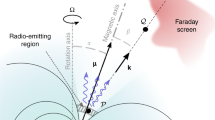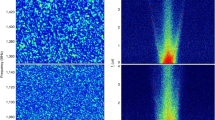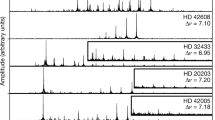Abstract
We have recently1 found the velocities of 26 pulsars from their proper motions as measured by a long-baseline radio inter ferometer. We now point out that these velocities are closely correlated with either the magnetic dipole moments or the moments of inertia of the pulsars as derived from the slow down of their rotation rates. Contrary to previous reports, we find no relation between the directions of the proper motions and the pulsar spin axes. A brief examination is made of possible explanations of the correlations with velocity and it is suggested that an asymmetry at the time of neutron star formation is responsible. The data do not seem to support the electromag netic acceleration process suggested by Harrison and Tademaru2.
This is a preview of subscription content, access via your institution
Access options
Subscribe to this journal
Receive 51 print issues and online access
$199.00 per year
only $3.90 per issue
Buy this article
- Purchase on Springer Link
- Instant access to full article PDF
Prices may be subject to local taxes which are calculated during checkout
Similar content being viewed by others
References
Lyne, A. G., Anderson, B. & Salter, J. M. Mon. Not. R. astr. Soc. 201, 503 (1982).
Harrison, E. R. & Tademaru, E. P. Astrophys. J. 201, 447–461 (1975).
Wyckoff, S. & Murray, C. A. Mon. Not. R. astr. Soc. 180, 717–729 (1977).
Manchester, R. N. & Taylor, J. H. Pulsars, 176 (Freeman, San Francisco, 1977).
Ostriker, J. P. & Gunn, J. E. Astrophys. J. 157, 1395–1417 (1969).
Pacini, F. Nature 216, 567–568 (1967).
Manchester, R. N., Taylor, J. H. & Van, Y. Y. Astrophys. J. Lett. 189, L119–L122 (1974).
Lyne, A. G., Ritchings, R. T. & Smith, F. G. Mon. Not. R. astr. Soc. 171, 579–597 (1975).
Lyne, A. G., Manchester, R. N. & Taylor, J. H. Preprint (University of Manchester, 1983).
Canuto, V. & Bowers, R. L. Pulsars, IAU Symp. No. 95, 321 (1981).
Helfand, D. J. & Tademaru, E. P. Astrophys. J. 216, 842–851 (1977).
van den Heuvel, E. P. J. Pulsars, IAU Symp. No. 95, 379 (1981).
Morris, D., Radhakrishnan, V. & Shukre, C. S. Nature 260, 124–126 (1976).
Tademaru, E. P. Astrophys. J. 214, 885–890 (1977).
Morris, et al. Astr. Astrophys. 73, 46–53 (1979).
Gott, J. R., Gunn, J. E. & Ostriker, J. P. Astrophys. J. Lett. 160, L91–L95 (1970).
Shklovsky, I. S. Astr. Zh. 46, 715 (1970).
de Cuyper, J.-P. Pulsars IAU Symp. No. 95, 399 (1981).
Fryxell, B. A. Astrophys. J. 234, 641–652 (1979).
Hillebrandt, W. in Supemovae: A Survey of Current Research (eds Rees, M. J. & Stoneham, R. J.) 123–155 (Reidel, Dordrecht, 1982).
Author information
Authors and Affiliations
Rights and permissions
About this article
Cite this article
Anderson, B., Lyne, A. On the origin of pulsar velocities. Nature 303, 597–599 (1983). https://doi.org/10.1038/303597a0
Received:
Accepted:
Issue Date:
DOI: https://doi.org/10.1038/303597a0
This article is cited by
-
The distribution of space velocities of pulsars
Astrophysics (1994)
-
Spatial velocities of pulsars
Journal of Astrophysics and Astronomy (1990)
Comments
By submitting a comment you agree to abide by our Terms and Community Guidelines. If you find something abusive or that does not comply with our terms or guidelines please flag it as inappropriate.



